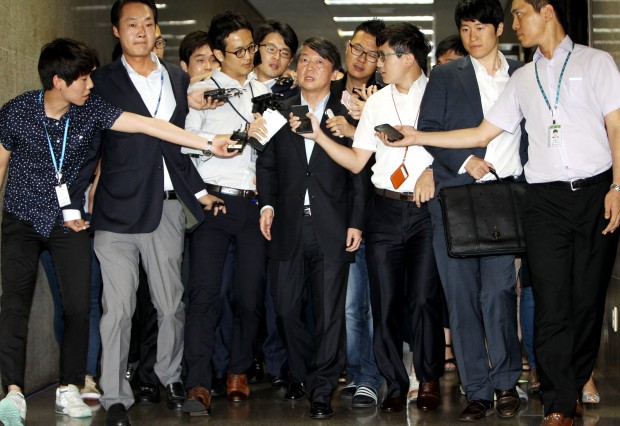Former opposition leader bolts from party

Ahn Cheol-soo (C), co-leader of the main opposition New Politics Alliance for Democracy, speaks to reporters at the National Assembly in Seoul, South Korea on July 31, 2014. Co-leaders of South Korea’s main opposition party resigned Thursday for a crushing defeat in the parliamentary by-elections seen as a mid-term referendum on the Park Geun-hye administration. (Xinhua/Park Jin-hee)
The New Politics Alliance for Democracy party’s former leader Rep. Ahn Cheol-soo bolted from the main opposition party Sunday, further aggravating factional strife and foreshadowing a realignment of the opposition bloc ahead of the parliamentary elections slated for next April.
During a press conference at the National Assembly, the entrepreneur-turned-politician pledged to establish a new political group strong enough to win the 2017 presidential vote, noting that his struggle to realize political reform from within the NPAD had failed.
The announcement came mere hours after botched eleventh-hour negotiations with NPAD chairman Rep. Moon Jae-in over how to lead the party to win the general elections amid deepening factional rifts and flagging public support.
Moon expressed his frustration on his Facebook account, saying “Today I really hate being in politics. I am so exhausted. I am pretty sure that other NPAD members feel the same.”
Hours before deciding to leave the party, Ahn clashed with Moon over the need for the party to hold a national convention to elect new leadership, a measure that Ahn claimed would overhaul the party faltering amid low approval ratings and repeated election defeats to the Saenuri Party.
While dismissing Ahn’s proposal as one that would only deepen the party’s factional infighting, Moon continued his last-minute efforts to bring Ahn back into the fold by paying an overnight visit to Ahn’s house Saturday. But Ahn reiterated that he would not change his mind unless Moon accepted his call to elect new leadership.
“I have pleaded constantly that the party needs a bold decision. I have told party members many times that we would die unless we changes the course. But there was no answer. … I tried to convince Moon of the need for the convention during phone calls, but I have failed,” said Ahn.
Ahn’s departure is expected to prompt NPAD dissenters’ to join Ahn and split the NPAD into different opposition groups, such as a brand-new party created by independent lawmaker Rep. Chung Jung-bae who defected from the NPAD in March.
Ahn’s confidant Rep. Moon Byeong-ho of the NPAD noted that he would leave the party no later than Dec. 15. He also expected that the NPAD would see the defection of up to 30 lawmaker, a number large enough to form a parliamentary negotiating body.
According to Assembly law, a political party of more than 20 lawmakers can form a negotiating body, which is entitled to more government subsidies and expanded parliamentary privileges than other minority parties falling short of 20 lawmakers.
Admitting that the likelihood that Ahn’s defection would lead to the creation of another opposition group, experts noted that Ahn’s defection is a viable option for the presidential hopeful to redeem himself amid his turbulent political career.
“Though (Ahn’s decision) is a bit late one, it is a viable option for him to create his own political group. If Ahn kept his position (with the NPAD), he would end up being just one of the ‘so-and-so’ lawmakers. Ahn is still regarded as a politician who epitomizes people’s desire for new leadership.” said Lee Jung-hee, political professor at Hankuk University of Foreign Studies.
Ahn, who was brought to prominence during the 2012 presidential election, cofounded the NPAD with Rep. Kim Han-gil and jointly held the chairmanship until July 2014. He resigned as chairman after the NPAD’s crushing defeats to the Saenuri Party in the 2014 by-elections.
(This article was published in The Korea Herald by Yeo Jun-suk)
























































